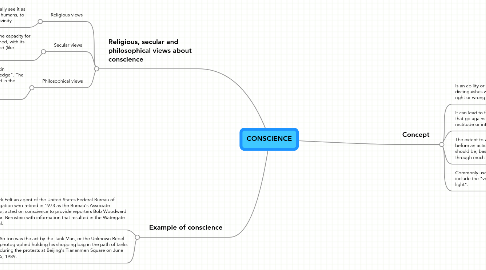CONSCIENCE
Jamal Toalaにより

1. Religious, secular and philosophical views about conscience
1.1. Religious views
1.1.1. Religious views of conscience usually see it as linked to a morality inherent in all humans, to a beneficent universe and/or to divinity.
1.2. Secular views
1.2.1. Common secular or scientific views regard the capacity for conscience as probably genetically determined, with its subject matter probably learned, or imprinted (like language) as part of a culture.
1.3. Philosophical views
1.3.1. The word "conscience" derives etymologically from the Latin conscientia, meaning "privity of knowledge or "with-knowledge". The English word implies internal awareness of a moral standard in the mind concerning the quality of one's motives, as well as a consciousness of our own actions
2. Example of conscience
2.1. W. Mark Felt an agent of the United States Federal Bureau of Investigation who retired in 1973 as the Bureau's Associate Director, acted on conscience to provide reporters Bob Woodward and Carl Bernstein with information that resulted in the Watergate scandal.
2.2. So too was the act by the Tank Man, or the Unknown Rebel photographed holding his shopping bag in the path of tanks during the protests at Beijing's Tiananmen Square on June 5, 1989.
3. Concept
3.1. Is an ability or a faculty that distinguishes whether one's actions are right or wrong
3.2. It can lead to feelings of remorse when a human does things that go against his/her moral values, and to feelings of rectitude or integrity when actions conform to such norms.
3.3. The extent to which conscience informs moral judgment before an action and whether such moral judgments are, or should be, based wholly in reason has occasioned debate through much of the history of Western philosophy.
3.4. Commonly used metaphors for conscience include the "voice within" and the "inner light".


